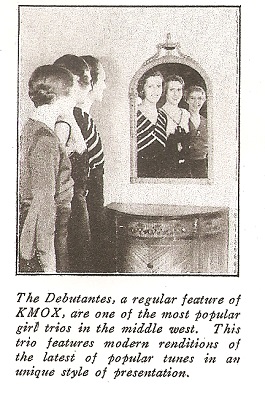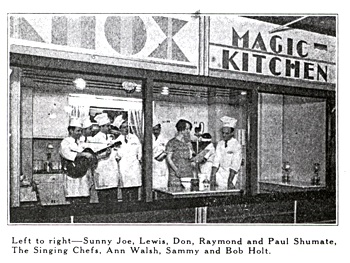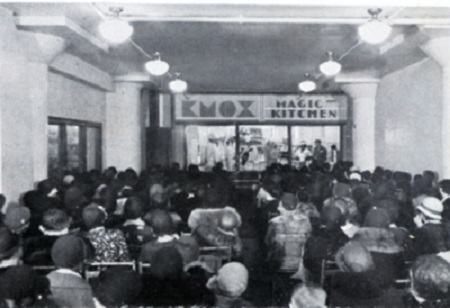Radio Articles
Nothing But Radio Appeals to Danny Seyforth
Many radio listeners recall the pleasant hours spent back in 1927 when there were few stations in St. Louis and their dials used to swing to WSBF, the Stix, Baer and Fuller Station. Since the days of 1925, ‘6 and ‘7, radio in the city of St. Louis has made rapid progress and it was in the early part of 1928 that WSBF went out of existence.
How many of you remember the name of Eddie Burback? Well, it was Eddie Burback and Danny Seyforth who appeared regularly on WSBF in a piano and singing act.
After WSBF went out of existence, Danny Seyforth floundered around until he finally formed a five-piece band, but the call of the radio brought him to Station KFVE, which was then located in the Egyptian Building in University City. Shortly after this KFVE was moved to the Hotel Chase, having been purchased by Thomas Patrick Convey for a group that financed the transaction.
Early KWK Artist
It wasn’t long before Danny Seyforth found himself working with a singing trio known as “The Varsity Boys” and in the early hectic days of KWK many of you recall the many hours of pleasure brought to your home by the trio. In fact, the Varsity Boys Trio became so popular that they were called to Chicago for an audition by the National Broadcasting Company. Like most trios, quartettes and other musical groups that start to get somewhere, something always occurs to break them up, and before the trio learned what their future might be with the National Broadcasting Company, they parted and each went in a different direction. Danny Seyforth, whom we are writing about, decided to go back to clerking, working for banks, railroads, shoe companies, paint companies, and even became a soda fountain clerk for short time.
Radio On His Mind
Evidently Danny’s numerous changes in jobs were brought about by dissatisfaction with these various types of work. He couldn’t get radio off his mind and his itching to return to radio caused him to drift into KWK where he met Bob Thomas who happened to be on duty at the time. Danny begged for a chance to start up a singing team and convinced Bob that he might, with a little training, be able to harmonize with him.
They didn’t know much about it but became enthusiastic, knuckled down to hard work, rehearsed day in and day out and finally convinced the Program Department of KWK that they had arrived at a point where they deserved a chance on the air.
The team of “Frank and Ernest” was the outcome, and while they have not as yet arrived at a point where booking agents are seeking their services for national network programs, they give promise of a future if they continue their hard work and do not become temperamental among themselves as many teams do.
Many have written to KWK to learn the identity of the “Early Morning Songster” and the story is now out – he is “Frank” of the “Frank and Ernest” team, who pays his income tax under the name of Danny Seyforth.
Hard Work His Diet
Danny Seyforth is so enthused about his future in radio that it is difficult to even get him to enter a bank, a shoe store, or a paint company where he formerly worked. You cannot even get him to ride on a railroad train. He prefers to travel by air, and even in hot weather it is difficult to get him near a soda fountain – BUT, show him a piano in a quiet atmosphere, a microphone and he is as contented as any human being could be. He doesn’t know a thing about music, never took a lesson, doesn’t know one note from the other, but somehow or other he manages to hit the right ivory at the right time. His fingers seem to synchronize with his ear and he is determined to work in the development of his technique in broadcasting – in fact, he said the other day that he would work until Niagara – Falls.
His fan mail at KWK is growing day by day. His postage bills have been running so high that he cannot even answer all his fan mail any more but endeavors to do so in a word of thanks now and then on the air and by sending out the type of material that most of the fans request.
Danny is still unattached, he is under twenty two years of age, his waist line is still under twenty-two inches, he is five feet seven inches tall and as far as can be discovered after close examination, his heart and his attentions have been devoted to one little girl whose first name begins with a “C.”
Now and again he fails for several days to shave his upper lip but he is gradually being sold on the idea that he takes a better photograph when his upper lip is shaved.
He spends all of his spare time about the studio grabbing a piano wherever it is not in use and when he cannot get accommodations at the Hotel Chase studios, he can be found at Kirkwood practicing and rehearsing in a little private studio that has been set aside out there for the development of Frank and Ernest and for emergency announcements or broadcasting.
(Originally published in Radio and Entertainment 1/23/1932).
 A new trio made its appearance to the radio audience of KMOX, The Voice of St. Louis, last Sunday at 10:15 a.m. The trio to which we refer is “The Debutantes” whose vocal harmonies attracted so much attention on Sunday’s broadcast that the telephones of KMOX were kept busy for hours answering calls from the inquiring audience who wanted to know just who these three girls really were.
A new trio made its appearance to the radio audience of KMOX, The Voice of St. Louis, last Sunday at 10:15 a.m. The trio to which we refer is “The Debutantes” whose vocal harmonies attracted so much attention on Sunday’s broadcast that the telephones of KMOX were kept busy for hours answering calls from the inquiring audience who wanted to know just who these three girls really were.

 The picture of the KMOX Magic Kitchen and its auditorium shown here gives only the very faintest idea of this unusual broadcast program and its setting. The kitchen itself, all glass-enclosed, is all electric, showing and using the latest in household appliances. The auditorium in front of it seats about three hundred persons and is filled to capacity every day during the program. Housewives come from far and near to inspect the kitchen’s many labor-saving devices and new accoutrements for better and easier housekeeping and cooking.
The picture of the KMOX Magic Kitchen and its auditorium shown here gives only the very faintest idea of this unusual broadcast program and its setting. The kitchen itself, all glass-enclosed, is all electric, showing and using the latest in household appliances. The auditorium in front of it seats about three hundred persons and is filled to capacity every day during the program. Housewives come from far and near to inspect the kitchen’s many labor-saving devices and new accoutrements for better and easier housekeeping and cooking.